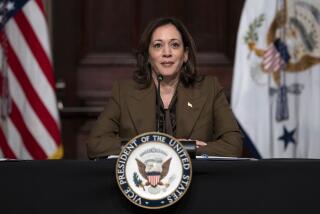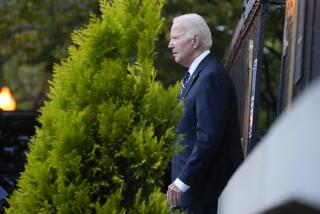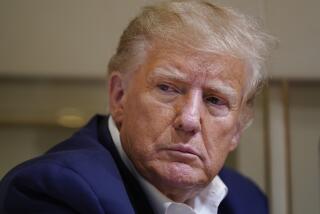IRAN-CONTRA AFFAIR: THE FINAL REPORT : Panels Say Bush Attended Meetings, Took No Stand
- Share via
WASHINGTON — The Iran-Contra majority report, released Wednesday, finds that Vice President George Bush was present at several meetings in which the arms-for-hostages deals were discussed, but he apparently played no role in shaping the policy and expressed no strong opinions about it.
The committees’ findings support Bush’s assertions that he was not involved in any of the operation’s questionable dealings.
Ammunition for Rivals
However, the findings also could provide ammunition to his rivals for the GOP presidential nomination, who could note that he was detached from a critical government initiative within his purview and, while aware of the operation, never objected to it.
Bush attended a Jan. 7, 1986, National Security Council briefing at which an Israeli proposal that arms be shipped to Iran in exchange for U.S. hostages was discussed. Although Defense Secretary Caspar W. Weinberger and Secretary of State George P. Shultz objected strenuously to that plan, “there is no record that the vice president expressed any views,” the report says.
The vice president also attended an important meeting in August, 1986, during which Weinberger and Shultz again opposed selling weapons to Iran. Weinberger and Shultz called it “a very bad idea,” the report says, but “none of the witnesses recalls the vice president’s position . . . .”
The document also reveals a previously unreported Sept. 10, 1985, meeting of Donald Gregg, who was Bush’s national security aide, Marine Lt. Col. Oliver L. North of the National Security Council and Col. James Steele, a U.S. military officer involved in the Contra supply effort.
Record of Meeting
A record of that meeting, found in North’s notebooks, contradicts Gregg’s testimony that he was unaware of the resupply operation before the summer of 1986.
Even after he was briefed on the operation in August, 1986, Gregg testified, he did not inform Bush because “he did not consider these facts worthy of the vice president’s attention,” the report says.
More to Read
Get the L.A. Times Politics newsletter
Deeply reported insights into legislation, politics and policy from Sacramento, Washington and beyond. In your inbox twice per week.
You may occasionally receive promotional content from the Los Angeles Times.










